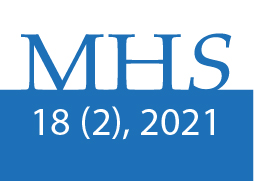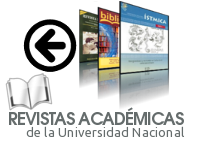Influence of Means of Initiation to Training in The Design of Tasks in Soccer in The School Age (U12)
DOI:
https://doi.org/10.15359/mhs.18-2.10Keywords:
sport, soccer, planning, trainingAbstract
Currently, studies around the organization of training processes through tasks have become one of the emerging lines in Sports Sciences. Therefore, the present paperwork aimed to analyze the way of acting of a technical body of a soccer team in school age, U12, as well as to know the relationship of the means of initiation to training and the pedagogical, external load, and organizational variables that influence the design of homework. For this, a total of 177 training tasks framed during five competitive months were examined. In order to categorize the tasks, the Comprehensive System for the Analysis of Training Tasks was used to study the variables identified by the technical staff. A descriptive and difference analysis was conducted of the variables proposed in the study with the training initiation medium. The results demonstrated the existence of associations between the training initiation medium and the variables game situation, game phase, content-type, specific content (pedagogical). Associations were also identified/found in the variables density, number of simultaneous performers, competitive load, game space, and cognitive involvement (external load), and the participation variable (organizational). Associations were also found in the variables density, number of simultaneous performers, competitive load, game space, and cognitive involvement (external load), and the participation variable (organizational). Therefore, these results show the importance of knowing the restrictions related to the workload of training tasks. In addition, they provide the technical body with information on an easy, affordable, and informative tool to quantify workload. This method should be considered as a complement to portable devices for training load control and monitoring in invasion sports.
References
Abad-Robles, M. T., Giménez, F. J., Robles, J., & Castillo, V. (2013). La formación de los entrenadores de jóvenes futbolistas. E-balonmano.com, Revista de Ciencias del Deporte, 9(2), 105-114. http://e-balonmano.com/ojs/index.php/revista/article/view/116
Baggiotto-Bettega, O., Rafaela-Galatti, L., Ibáñez-Godoy, S., Antunez-Medina, A., & José-Scaglia, A. (2019). Proceso de enseñanza-entrenamiento de jóvenes en el fútbol: posibilidades a partir de un modelo ondulatorio. SPORT TK-Revista EuroAmericana de Ciencias del Deporte, 8(2), 17–25. https://doi.org/10.6018/sportk.391711
Baggiotto, O., Scaglia, A. J., Pereira, M., & Galatti, L. R. (2015). Formação de jogadores de futebol: princípios e pressupostos para composição de uma proposta pedagógica. Movimento, 21(3), 791-801. https://doi.org/10.22456/1982-8918.49051
Cañadas, M. y Ibáñez, S. J. (2010). La planificación de contenidos de entrenamiento de Baloncesto en equipos de iniciación. E-Balonmano: Revista de Ciencias del Deporte, 6(1), 49-65.
Cañadas, M., Ibáñez, S. J., & Leite, N. (2015). A novice coach’s planning of the technical and tactical content of youth basketball training: A case study. International Journal of Performance Analysis in Sport, 15, 572-587. https://doi.org/10.1080/24748668.2015.11868815
Cañadas, M., Ibáñez, S. J., García, J., Parejo, I., & Feu, S. (2013). Las situaciones de juego en el entrenamiento de baloncesto en categorías base. Revista Internacional de Medicina y Ciencias de la Actividad Física y del Deporte, 13(49), 41-54.
Casamichana, D., Castellano, J., & Castagna, C. (2012). Comparing the physical demands of friendly matches and small-sided games in semiprofessional soccer players. The Journal of Strength y Conditioning Research, 26(3), 837-843. http://doi.org/10.1519/JSC.0b013e31822a61cf
Crewson, P. (2006). Applied statistics handbook. Version 1.2. Leesburg: AcaStat Software.
Davids, K., Araújo, D., Correia, V., & Vilar, L. (2013). How small-sided and conditioned games enhance acquisition of movement and decision-making skills. Exercise and Sport Sciences Reviews, 41(3), 154-161. https://doi.org/10.1097/JES.0b013e318292f3ec
Feu, S., García-Rubio, J., Gamero-Portillo, M. G., & Ibáñez, S. J. (2019). Task planning for sports learning by physical education teachers in the pre-service phase. Plos One, 14, 1-18. https://doi.org/10.1371/journal.pone.0212833
Field, A. (2009). Discovering statistics using SPSS (3.a ed.). London (England): SAGE Publications Ltd.
Galatti, L. R., Scaglia, A. J., Bettega, O. B., & Paes, R. (2016). Coaches’ perceptions of youth players’ development in a professional soccer club in Brazil: paradoxes between the game and those who play. Sports Coaching Review, 5(2), 174 -185. https://doi.org/10.1080/21640629.2016.1201359
Gamero-Portillo, M de G., García-Ceberino, J. M., Feu, S., & Antúnez, A. (2019). Estudio de las variables pedagógicas en tareas de enseñanza de fútbol en función de la parte de sesión. SPORT-TK: Revista Euroamericana de Ciencias del Deporte, 8(2), 39-46. https://doi.org/10.6018/sportk.401091
Gamero, M de G., García-Ceberino, J. M., Feu, S., Antúnez, A., & Córdoba, L. (2019). Case study of the programs for soccer teaching of two teachers in training versus the tactical game approach model. Journal of Human Sport & Exercise, 14(4), S1559-S1562. http://doi.org/10.14198/jhse.2019.14.Proc4.82
Gamero, M. de G., García-Ceberino, J., Reina, M., Feu, S., & Antúnez, A. (2020). Estudio de las variables pedagógicas de las tareas de baloncesto en función de las fases de juego. Retos: Nuevas Tendencias en Educación Física, Deporte y Recreación, 37, 556-562. https://doi.org/10.47197/retos.v37i37.71243
Gamonales, J. M., Gómez-Carmona, C. D., Córdoba-Caro, L. G., & Ibáñez, S. J. (2019). Influencia del perfil de entrenador en el diseño de las tareas en el fútbol. Estudio de caso. Journal of Sport and Health Research, 11(1), 69-82. https://recyt.fecyt.es/index.php/JSHR/article/view/80933/0
Gamonales, J. M., Gómez-Carmona, C. D., León, K., García-Santos, D., Gamero-Portillo, M. G., & Muñoz-Jiménez, J. (2019). Análisis de las tareas de Entrenamiento en fútbol base: diferencias entre dos meses durante el periodo competitive en la categoría sub-19. Sportis: Revista Técnico-Científica del Deporte Escolar, Educación Física y Psicomotricidad, 5(1), 30-52. http://doi.org/10.17979/sportis.2019.5.1.3469
Gamonales, J. M., Gómez-Carmona, C. D., León, K., Muñoz-Jiménez, J., & Ibáñez, S. J. (2020). Estudio de las variables pedagógicas en tareas de entrenamiento en fútbol-base según el mesociclo competitivo. Un estudio de casos. RETOS: Nuevas Tendencias en Educación Física, Deporte y Recreación, 37(1), 486-492. https://doi.org/10.47197/retos.v37i37.71401
Gamonales, J. M., León, K. y Muñoz-Jiménez, J. (2021). Relación entre la presencia del portero y las variables pedagógicas que definen las tareas en el fútbol. Un estudio de caso. MHSalud: Revista en Ciencias del Movimiento Humano y Salud, 18(1), 1-14. https://doi.org/10.15359/mhs.18-1.4
García-Ceberino, J. M., Antúnez, A., Feu, S., & Ibáñez, S. J. (2020). Quantification of Internal and External Load in School Football According to Gender and Teaching Methodology. International Journal of Environmental Research and Public Health, 17(1), 344. http://doi.org/10.3390/ijerph17010344.
García-Ceberino, J. M., Feu, S., & Ibáñez, S. J. (2019). Comparative study of two intervention programmers for teaching soccer to school-age students. Sports, 7(3), 1-16. http://doi.org/10.3390/sports7030074
García-Ceberino, J. M., Gamero, M. G., Feu, S., & Ibáñez, S. J. (2019). The mean of teaching as a determinant of the external Training Load of the tasks used to teach school soccer. ESHPA - Education, Sport, Health and Physical Activity, 3(3), 412-427. http://doi.org/10481/48260
García-López, L. M., Serra-Olivares, J., Pastor, J. C., Simón, J. A., Picazo, C., & Gutiérrez, D. (2019). Formatos competitivos en el fútbol sub-12. Un análisis desde el punto de vista táctico, condicional y del compromiso deportivo del joven futbolista. Kronos, 18(1), 1-11.
Gómez-Carmona, C. D., Gamonales, J. M., Feu, S., & Ibáñez, S. J. (2019). Estudio de la carga interna y externa a través de diferentes instrumentos. Un estudio de casos en fútbol formativo. Sportis: Revista Técnico-Científica del Deporte Escolar, Educación Física y Psicomotricidad, 5(3), 444-468. http://doi.org/10.17979/sportis.2019.5.3.5464
Gómez-Carmona, C. D., Gamonales, J. M., Pino-Ortega, J., & Ibáñez, S. J. (2018). Comparative Analysis of Load Profile between Small-Sided Games and Official Matches in Youth Soccer Players. Sports, 6(4), 173. http://doi.org/10.3390/sports6040173
Gómez-Carmona, C. D., García-Rubio, J., Muñoz-Jiménez, J. y Gamonales, J. M. (2018). Relación entre el medio de iniciación al entrenamiento y las variables pedagógicas que definen las tareas en el fútbol. TRANCES: Revista de Transmisión del Conocimiento Educativo y de la Salud, 10(1), 401-420.
Gracia, F., García-Rubio, J., Cañadas, M., & Ibáñez, S. J. (2014). Diferencias en la frecuencia cardíaca en situaciones de juego modificadas en baloncesto de formación. E-balonmano.com: Revista de Ciencias del Deporte, 10(1), 23-30.
Ibáñez, S. J. (2008). La planificación y el control del entrenamiento técnico-táctico en Baloncesto. En N. Terrados & J. Calleja (Eds.), Fisiología, entrenamiento y medicina del Baloncesto (pp. 231-250). Barcelona: Paidotribo.
Ibáñez, S. J., Feu, S. y Cañadas, M. (2016). Sistema integral para el análisis de las tareas de entrenamiento, SIATE, en deportes de invasión. E-balonmano.com: Revista de Ciencias del Deporte, 12(1), 3-30.
Ibáñez, S. J., Feu, S., Reina, M., & García-Rubio, J. (2019). El control de entrenamiento como medio de formación permanente del entrenador de baloncesto. En S. J. Ibáñez, S. Feu, & J. García-Rubio (Coord.). Los procesos de formación y rendimiento en baloncesto. Progresos científicos para su mejora (pp.423-440). Sevilla: Wanceulen Editorial.
Ibáñez, S. J., Jiménez, A. y Antúnez, A. (2015). Diferencias en las cargas de entrenamiento en baloncesto entre los modelos de enseñanza/entrenamiento comprensivo y técnico. Revista de Psicología del Deporte, 24(3), 47-50.
Ibáñez, S. J., Parra, M. Á. y Asensio, J. M. (1999). Taxonomía de medios para la iniciación al baloncesto. Red: Revista de Entrenamiento Deportivo, 13(4), 15-24.
Ibáñez, S. J., Pérez-Goye, E., García-Rubio, J., & Courel-Ibáñez, J. (2020). Effects of task constraints on training workload in elite women’s soccer. International Journal of Sports Science & Coaching, 15(1), 99-107. http://dx.doi.org/ 10.1177/1747954119891158
Mancha-Triguero, D., García-Ceberino, J. M., Antúnez, A., & García-Rubio, J. (2018). ¿Afecta la fase de juego al diseño de las tareas de un equipo de baloncesto de formación? SPORT-TK: Revista Euroamericana de Ciencias del Deporte, 7(2), 27-36. https://doi.org/10.6018/sportk.343201
Martín-Barrero, A., & Martínez-Cabrera, F. I. (2019). El modelo de juego en el fútbol. De la concepción teórica al diseño práctico. RETOS: Nuevas tendencias en Educación Física, Deporte y Recreación, 36(36), 543-551. https://doi.org/10.47197/retos.v36i36.71021
Montero, I., & León, O. G. (2007). A guide for naming research studies in Psychology. International Journal of Clinical and Health Psychology, 7(3), 847-862.
Newell, J., Aitchison, T., & Grant, S. (2014). Statistics for sports and exercise science: a practical approach. London and New York: Routledge Taylor & Francis Group.
Ocaña-Wilhelmi, F. J., & Delgado-García, G. (2018). Efecto de la modelación táctica sobre la frecuencia de elección de los fundamentos tácticos de ataque en fútbol. Revista de Entrenamiento Deportivo, 31(4), 10-21.
Pazo, C. I., Sáenz-López, P., Fradua, L., Barata, A. J., & Coelho, M. J. (2011). La formación de los jugadores de fútbol de alta competición desde la perspectiva de los coordinadores de cantera. Apunts: Educación Física y Deportes, 104, 56-65. https://dx.doi.org/10.5672/apunts.2014-0983.es.(2011/2).104.06
Práxedes, A., Sevil, J., García-González, L., Moreno, A., & Del Villar, F. (2017). Análisis de la participación en el juego de futbolistas en formación. Efecto sobre la configuración reglamentaria en las diferentes categorías de edad. Kronos: Revista Universitaria de la Actividad Física y el Deporte, 16(2), 1-7.
Reina, M., González, S., Cañadas, M., & Ibáñez, S. J. (2018). Análise das variáveis pedagógicas nas tarefas de small sided games e full game no basquetebol. Revista Corpoconsciência, 22(2), 1-13.
Silva, A., Sánchez-Bañuelos, F., Garganta, J., y Anguera, M. T. (2005). Patrones de juego en el fútbol de alto rendimiento. Análisis secuencial del proceso ofensivo en el campeonato del mundo Corea-Japón 2002. Cultura, Ciencia y Deporte, 1, 65-72. http://dx.doi.org/10.12800/ccd.v1i2.95
Urbano-Arévalo, F. J., Mancha-Triguero, D., Gómez-Carmona, C. D. y Gamonales, J. M. (2020). Influencia del perfil del entrenador en el diseño de tareas en fútbol-base. Estudio de casos. RETOS: Nuevas Tendencias en Educación Física, Deporte y Recreación, 38(2), 204-212. https://doi.org/10.47197/retos.v38i38.74456
Wiersma, L. D., & Sherman, C. P. (2005). Volunteer youth sport coaches’ perspectives of coaching education/certification and parental codes of conduct. Research Quarterly for Exercise and Sport, 76(3), 324-338.
Published
How to Cite
Issue
Section
License
General conditions
MHSalud: Journal in Human Movement Sciences and Health by the Universidad Nacional is cover under a Creative Commons Atribución-NoComercial-SinDerivadas 3.0 Costa Rica license.
The journal is hosted in open access repositories such as the Institutional Repository of the Universidad Nacional, the Kimuk Repository of Costa Rica and La Referencia.
The editorial source of the journal must be recognized. Use the doi identifier for this purpose.
Self-archiving policy: The journal allows the self-archiving of the articles in their peer-reviewed version, edited and approved by the Editorial Board of the Journal to be available in Open Access through the Internet. More information in the following link: https://v2.sherpa.ac.uk/id/publication/25815



















